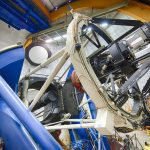From University of Chicago, Jan. 9, 2019: After scanning about a quarter of the southern skies over 800 nights, the Dark Energy Survey finished taking data on Jan. 9. It ends as one of the most sensitive and comprehensive surveys of its kind, recording data from more than 300 million distant galaxies. Fermilab, an affiliate of the University of Chicago, served as lead laboratory on the survey, which included more than 400 scientists and 26 institutions.
Dark Energy Survey
From Republica, Jan. 9, 2019: Los astrofísicos que han participado en el proyecto Dark Energy Survey han finalizado hoy la toma de datos para cartografiar con un detalle sin precedentes una octava parte del cielo, tras seis años de trabajos en los que han acumulado datos de más de 300 millones de galaxias lejanas.
From, El Dia, Jan. 9, 2019: El trabajo fue po astrofísicos del proyecto Dark Energy Survey, tras seis años de observación en los que acumularon información de más de 300 millones de galaxias lejanas.
From insideHPC, Jan. 9, 2019: After scanning in depth about a quarter of the southern skies for six years and cataloging hundreds of millions of distant galaxies, the Dark Energy Survey finishes taking data on Jan. 9. The National Center for Supercomputing Applications at the University of Illinois will continue refining and serving this data for use by scientists into 2021.
From estrella digital, Jan. 9, 2019: Los astrofísicos que han participado en el proyecto Dark Energy Survey han finalizado hoy la toma de datos para cartografiar con un detalle sin precedentes una octava parte del cielo, tras seis años de trabajos en los que han acumulado datos de más de 300 millones de galaxias lejanas.
After scanning in depth about a quarter of the southern skies for six years and cataloguing hundreds of millions of distant galaxies, the Dark Energy Survey will finish taking data on Jan. 9. DES scientists recorded data from more than 300 million distant galaxies. More than 400 scientists from over 25 institutions around the world have been involved in the project, hosted by Fermilab. The collaboration has already produced about 200 academic papers, with more to come.
From Gizmodo, Nov. 27, 2018: University of Portsmouth measure the Hubble constant using Dark Energy Survey data.
From Wired, Nov. 20, 2018: Scientists use Dark Energy Survey data to recalculate the Hubble constant.
From Physics World, Nov. 21, 2018: University of Portsmouth scientists used data from the Dark Energy Survey to remeasure the Hubble constant.
From The Archaeology News Network, Nov. 12, 2018: Using Dark Energy Survey data, researchers from the University of Portsmouth have come up with a new measurement of one of the most debated topics in cosmology.

